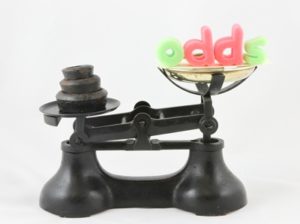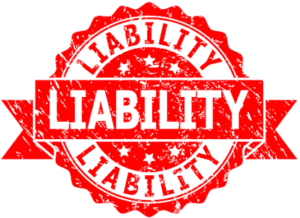 While most people think of bookmakers as being operations that provide sports betting opportunities to gamblers, not many of us think of them betting against one another. After all, it seems quite a silly thing to think of, right? In our mind’s eye, bookmakers should be competing for the custom of bettors, rather than against each other.
While most people think of bookmakers as being operations that provide sports betting opportunities to gamblers, not many of us think of them betting against one another. After all, it seems quite a silly thing to think of, right? In our mind’s eye, bookmakers should be competing for the custom of bettors, rather than against each other.
It is not uncommon, however, to find that bookmakers will offset their liabilities against each other, should their books be out of balance. This assists with evening out the odds to a more house-friendly level. Of course, is this actually considered betting against another bookmaker? Or is it just a standard practice to clear liabilities? How do these sites go about balancing their books? Obviously, they cannot simply contact another bookmaker up and sort this out themselves. In that respect, how are these “bets” against one another fixed up?
This is all information that we are going to be looking at today. We will be uncovering exactly how bookmakers enter into bets against one another, why they do this, and what the outcome of these situations are.
How Odds Work
 If you have ever visited and joined an online sports betting site, you will know that they have masses of events for you to wager on. Each event also tends to have a variety of markets for you to access too, so there is plenty for you to enjoy. Of course, each sportsbook needs to add odds for each of these markets, and this is what the bettor looks at and takes a decision on whether they want to bet, and if so, which team or outcome they would like to back. It is common to wonder where these companies get their odds from, though.
If you have ever visited and joined an online sports betting site, you will know that they have masses of events for you to wager on. Each event also tends to have a variety of markets for you to access too, so there is plenty for you to enjoy. Of course, each sportsbook needs to add odds for each of these markets, and this is what the bettor looks at and takes a decision on whether they want to bet, and if so, which team or outcome they would like to back. It is common to wonder where these companies get their odds from, though.
Well, the concept of calculating the likely chance of a winner in a horse race and then converting that into bookmaker odds, was actually a system devised by one Harry Ogden. And despite the fact that some people believe today’s gambling industry is actually eating itself, the system he created has endured since the early 1790s.
Ogden operated out of Newmarket Heath at this point, and he was the first bookmaker to take betting beyond its origins. Most bets prior to this time were simply a way of settling an argument over whether player or side A would be victorious, or player/side B would be. Ogden began his process of making a book but knew he would need to have a percentage of the takings for himself at the same time. To do this, he adjusted the prices very slightly in his own favour. And it worked, too! Should someone win a bet and received a payout at odds of 4/1, it was very unlikely that they would complain, even though they had not received the true probability of 6/1, for example.
Any perfect book, prior to factoring in a profit (or margin) for the bookie themselves, would mean that the implied probability of any and all outcomes would add up to 100%. Bookies utilise the concept of something known as overround, which allows the probability to stretch beyond 100%, and this extra becomes the profit that they earn.
What Is Overround?
 To put it bluntly, overround is the practice of factoring in a profit margin on the prices that a bookmaker offers. It helps them to determine the odds for each event and market, informing how much profit they will hope to make in the process. It is also one of the reasons why sportsbooks like to heavily push bettors to engage in accumulators for football or horse racing. Should there be an overround of 105% on each of the five, six or beyond selections within an accumulator, a gambler is betting against an overround of 125%, 130% and so on. The extra 5% is added on to each of the selections within, meaning more profit for the sportsbook.
To put it bluntly, overround is the practice of factoring in a profit margin on the prices that a bookmaker offers. It helps them to determine the odds for each event and market, informing how much profit they will hope to make in the process. It is also one of the reasons why sportsbooks like to heavily push bettors to engage in accumulators for football or horse racing. Should there be an overround of 105% on each of the five, six or beyond selections within an accumulator, a gambler is betting against an overround of 125%, 130% and so on. The extra 5% is added on to each of the selections within, meaning more profit for the sportsbook.
By the 1960s, when off-track betting was legalised, bookmakers within the UK were employing odds-traders. This would help them to compile the first show of prices for horse racing or greyhounds. Bookmakers would, and still do, collude so as to ensure that their assessments of the market were not insanely out of whack. Those prices were not and have never been fixed, though. They move to respond to market forces following the first display of prices.
But what does a bookie do when it seems as though liabilities are in danger of becoming too big on one particular horse or team?
The Difficulties Surrounding Overround
 While overround is one of those creations that has provided the sports betting world with a key element, the challenge that bookies face is keeping overround in place while the remaining factors alter. Bettors do not always bet equally on all outcomes of a market, with more players likely to back one side more so than the other. This is why bookmakers tend to over shorter odds on one option (the favourite) and lengthen the odds on the other option. Of course, great care is taken at this point to also protect the overround. The bookies do not want to lose out on their income from the bets placed.
While overround is one of those creations that has provided the sports betting world with a key element, the challenge that bookies face is keeping overround in place while the remaining factors alter. Bettors do not always bet equally on all outcomes of a market, with more players likely to back one side more so than the other. This is why bookmakers tend to over shorter odds on one option (the favourite) and lengthen the odds on the other option. Of course, great care is taken at this point to also protect the overround. The bookies do not want to lose out on their income from the bets placed.
Sometimes, it can be quite a simple process to undertake – adjusting the odds. With an improvement on odds in one way, more punters are likely to start backing the other outcome as a result. In this case, where does betting against another online bookmaker come into effect? What can this possibly have to do with securing the overround and, subsequently, the profit?
Offsetting Liabilities To Balance A Book
 The best way to advise you on how bookmakers bet against one another is to proceed with a simple example. Different companies will look to offset liabilities against each other for their unbalanced books.
The best way to advise you on how bookmakers bet against one another is to proceed with a simple example. Different companies will look to offset liabilities against each other for their unbalanced books.
Let us say that a match is coming up with an English team, say Liverpool, taking on Spain’s Barcelona in the Champions League. Now, it is fairly common in such an instance for British bettors to back their home country side, while Spanish fans of sports betting would be more likely to back Barcelona in this example. Therefore, the most likely outcome of such betting would be for the British bookmaker to have more gamblers backing Liverpool and the Spanish bookmaker having more backing Barcelona. This results in unbalanced books for both bookies, although on different teams. Regardless, each one is overexposed on one side.
The British bookmaker now has a simple choice to make. First of all, they could proceed with the risk that the English team will lose and thereby acquire plenty of profit from the overexposed bets on the team. However, this is a very easy way to go out of business, and taking such large risks is not something that most bookmakers are willing to do. Instead, where it is possible, bookmakers will lay their liabilities with other bookmakers. This operates in a similar way to what can be done through betting exchanges, like the one provided by Betfair.
Using the same example noted above, the UK bookmaker can opt to lay their overall liability with the Spanish bookmaker and vice versa. In this circumstance, both bookies will make a small profit either way, thanks to their margins, and this means that there is not any risk involved at the same time. The question is, how do they go about doing this?
Utilising Wholesale Bookmakers
 It is at this point that wholesale bookmakers step in, and they essentially operate as a clearing house for any unbalanced books. Wholesale bookies essentially cover a bookie in about 99% of cases. Of course, there will always be cases where all available bookies have liabilities on one and the same market. In this respect, there will be far fewer options when it comes to laying liabilities elsewhere. Therefore, the whole industry stands to lose if the favourite being backed gets the win, and that is just how things fall sometimes. An example of this might be the favourite winning the Grand National, all bookies would lose out in this instance.
It is at this point that wholesale bookmakers step in, and they essentially operate as a clearing house for any unbalanced books. Wholesale bookies essentially cover a bookie in about 99% of cases. Of course, there will always be cases where all available bookies have liabilities on one and the same market. In this respect, there will be far fewer options when it comes to laying liabilities elsewhere. Therefore, the whole industry stands to lose if the favourite being backed gets the win, and that is just how things fall sometimes. An example of this might be the favourite winning the Grand National, all bookies would lose out in this instance.
Even though punters can collectively beat the sportsbooks, it is not such a common occurrence. Bookies only ever tend to complain when they lose out. When they stay quiet, as they do most of the time, you know they are making a profit.
If you have ever participated in placing bets via an exchange, then you will already know a little bit about how wholesale bookmakers operate. This is because they have a very similar way of working. Exchanges automatically match back and lay bets between different bettors, thereby cutting out the need for the bookmaker’s traditional profit margin. They operate a market index of prices near to but usually not at 100% competitiveness. Exchanges do take commissions on winnings just as wholesale bookies will do for operators using them to clear liabilities.
Wholesale bookies therefore simply buy risk for the commission they receive from it. Look at them as being like a clearance house, matching up the liabilities between different operators, in the same way that an exchange matches back and lay bets between different gamblers. This then allows both the bookmakers to acquire profit, without having to rely on a risky outcome of an overexposed market losing and them gaining some profit that way. In essence, betting against another bookmaker is only a good thing for both operators involved.
A balanced book is always going to be something that an online bookmaker looks for, and they will go to whatever lengths needed to obtain this. When you consider betting, you need to remember that a sportsbook is simply looking to garner its own profit from whenever a player places a bet. And, as noted before, this is why they heavily push for accumulators to be taken up by their members. With enhanced overround coming from such accas, they stand to benefit much more than they would in comparison to a standard singles bet.
